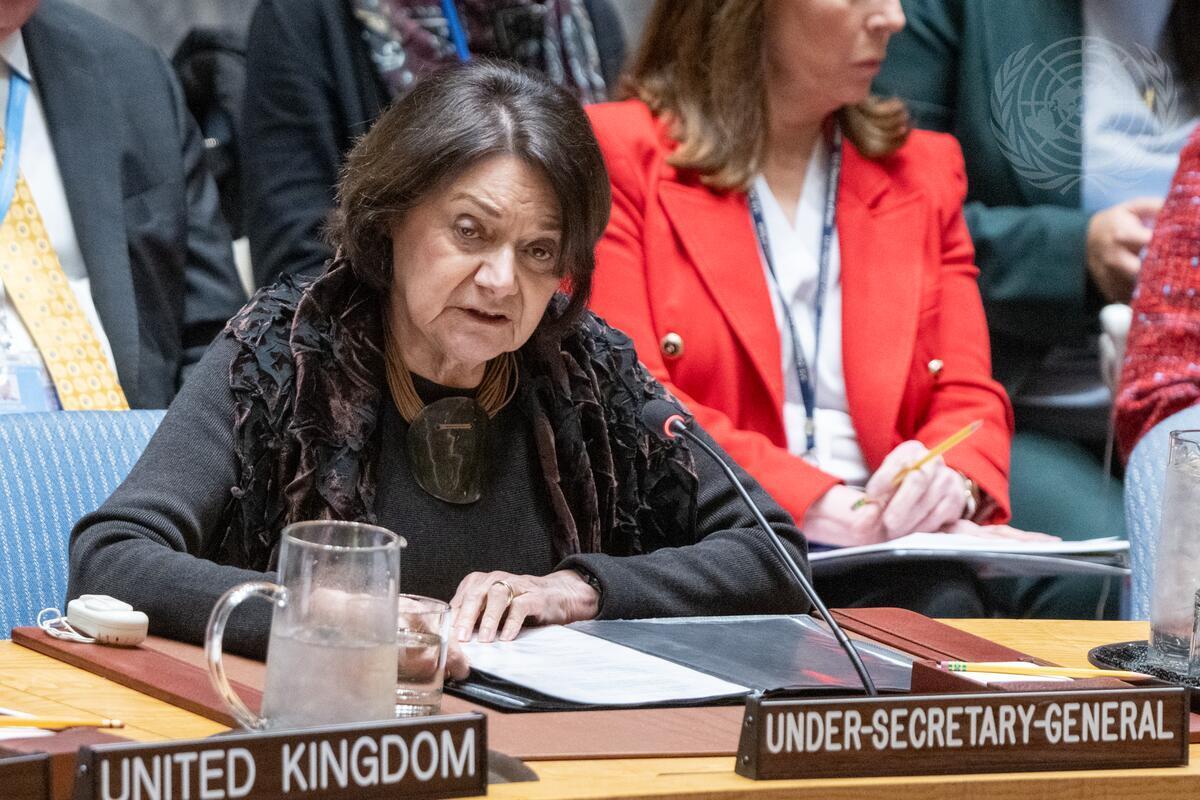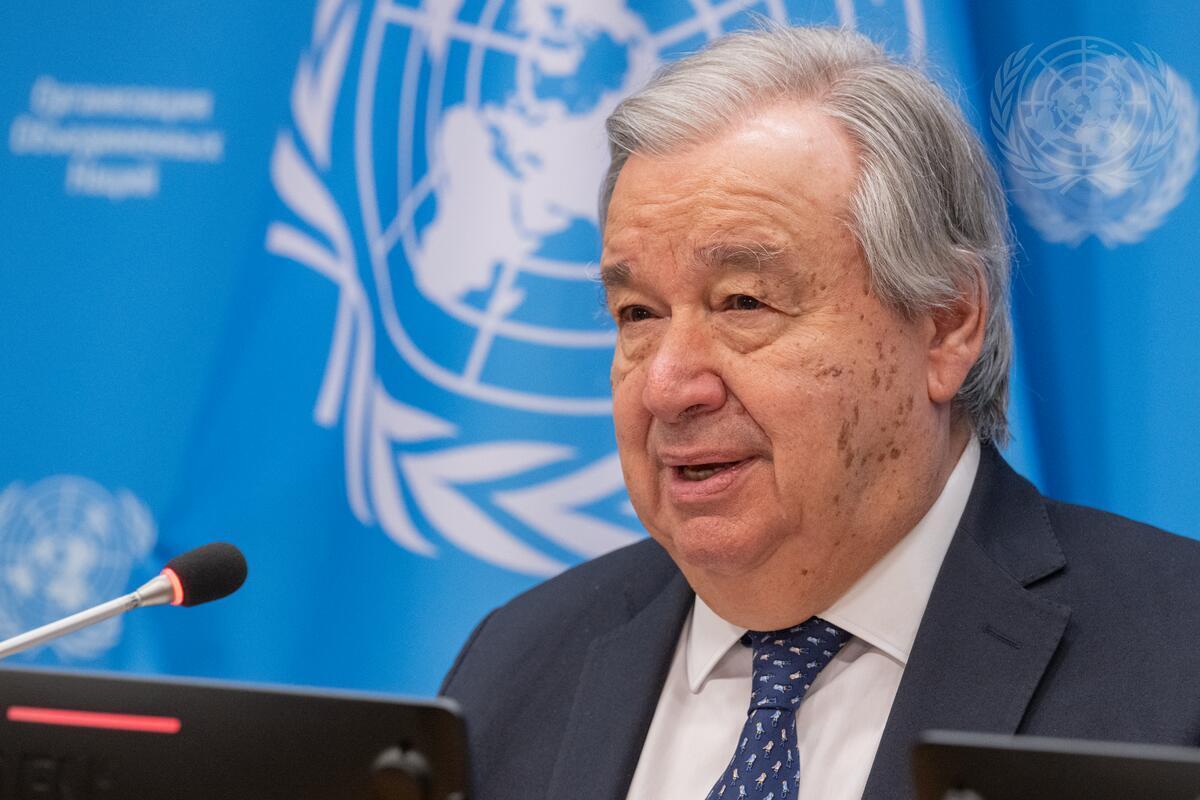Mr. President,
Excellencies,
Members of the Security Council,
I thank you for your sustained attention to the grave developments unfolding in Israel and the Occupied Palestinian Territory, particularly in and around Gaza.
In light of the horrific violence of these past weeks, allow me to begin by expressing my most sincere condolences to the thousands of families – in Israel, Palestine and across the globe – who are in mourning, in shock and in profound pain. This includes the families of 35 UN staff killed in Gaza.
The abhorrent attack launched by Hamas on 7 October and Israel’s devastating, ongoing military operation in Gaza have taken a staggering toll on civilians and deeply shaken Israelis and Palestinians alike. As I told this Council last week and the Secretary-General has just expressed, the events we are witnessing are unprecedented; they risk expanding to the wider region and may have a profound long-term impact on the dynamics of the Israeli-Palestinian conflict.
Mr. President,
On the morning of 7 October, Hamas and other Palestinian armed groups launched a large-scale, complex assault on Israel. The unprecedented attack saw an estimated 1,500 Hamas and Palestinian Islamic Jihad militants from Gaza infiltrate some twenty Israeli communities and military facilities in the Gaza periphery by land, sea and air, while thousands of rockets were launched towards central Israel, including Tel Aviv and Jerusalem.
Testimony and evidence emerging from that tragic day reveal a sickening killing spree, designed to terrorize, with appalling scenes of brutality, massacres and hostage-taking, including against infants and young children. In all, Hamas and other Palestinian militant-groups killed over 1,400 Israelis and foreign nationals – the bloodiest attack in Israel’s history. This includes over 1,000 civilians, many of them women and children, and over 360 security forces personnel. Over 5,400 Israelis were injured.
At least 220 civilians, including women and children, as well as soldiers, were abducted and taken into the Gaza Strip as hostages. While not confirmed, Hamas has said that 22 hostages were killed by Israeli strikes. I welcome the release of four hostages and recognize the important roles of Egypt [sic] and Qatar in this regard. To the families of hostages, some of whom are with us today, the fear and uncertainty you have had to endure is unimaginable. As the Secretary-General and I have said repeatedly, your loved ones must be returned to you immediately and unconditionally.
Heavy fighting between Israeli forces and militants inside Israeli communities continued until 10 October, when the Israel Defense Forces (IDF) said it regained control of the perimeter fence. Over 120,000 Israelis were displaced from the area.
Hamas and other Palestinian militant groups in Gaza have continued to launch indiscriminate rocket fire from Gaza into Israel, reaching as far north as Haifa. To date, according to Israeli sources, some 7,700 rockets have been launched.
Mr. President,
On the day of the attack, Israel’s Security Cabinet declared a state of war for the first time in over 50 years, with the aim of “the destruction of the military and governing capabilities of Hamas and Islamic Jihad.” That same day, Israeli forces began a massive bombardment of what they said were Hamas sites throughout Gaza. Israeli air assault in the Strip has continued to date, with some 5,000 such sites targeted, according to the IDF. On 8 October, Israel’s Minister of Defense announced a complete siege of Gaza, blocking all entry of goods, including electricity, water, food, fuel, and medical equipment.
The airstrikes have been devastating and resulted in a staggering number of Palestinian fatalities, a vast number of whom are civilians. Thus far, the Ministry of Health (MoH) in Gaza has reported over 5,000 Palestinians killed, including over 1,100 women, 2,000 children as well as journalists, medical workers and first responders, with more than 15,000 injured. Authorities estimate that hundreds more lay dead or injured under the rubble as rescue efforts languish amid continuous airstrikes. Over 1 million Palestinians have been displaced.
The level of physical destruction has left entire neighborhoods in rubble and critical infrastructure has been destroyed or damaged. Schools, including UNRWA schools, and hospitals -- many sheltering displaced Palestinians -- have been hit. Displacement levels are unprecedented.
Compounding the destruction from airstrikes, the humanitarian impact has been immense. In this regard, I welcome Egypt’s facilitation to open the Rafah border crossing on 21 October and reiterate that humanitarian assistance needs to flow safely and continuously into the Strip.
I echo the Secretary-General’s appeal for an immediate humanitarian ceasefire.
Lynn Hastings, the Humanitarian Coordinator in the OPT, will report in full on the humanitarian situation on behalf of the Under Secretary General for Humanitarian Affairs and Emergency Relief Coordinator Martin Griffiths.
Mr. President,
The risk of a significant further deterioration of the situation in the occupied West Bank or spillover of the conflict in the region remains significant.
Violence in the occupied West Bank, including East Jerusalem – already at worrying levels – has increased since the outbreak of war. Israeli authorities have imposed widespread movement restrictions and conducted extensive arrests. High numbers of daily clashes and armed exchanges between Palestinians and Israeli security forces and settlers have been recorded, as well as settler-related violence and Palestinian attacks against Israelis. Since 7 October, 93 Palestinians, including 27 children, have been killed by ISF or settlers, and one Israeli security personnel was killed in an armed exchange. Large demonstrationsin solidarity with the Gaza population took place in cities across the West Bank, with some leading to confrontations with Palestinian Security Forces.
Meanwhile, across the Blue Line, and amid heightened rhetoric from actors on the ground, there have been daily intermittent but intense exchanges of fire since 8 October. Hezbollah, Hamas and Palestinian Islamic Jihad have launched rockets and anti-tank missiles toward Israel, while IDF responded with artillery fire and air strikes, leading to casualties on both sides. On 13 and 20 October, two journalists were killed. Palestinian militants from Lebanon have also made several infiltration attempts, the most significant, on 9 October. Over 80,000 Israelis have been evacuated from their homes and some 20,000 Lebanese have been displaced.
On the Golan, the Israeli Defense Forces responded on 10 October with artillery and mortar shells towards what they said were a number of launches from Syria toward Israel. Syrian state media reported Israeli air attacks on 12 and 22 October targeting the international airports in Damascus and Aleppo, and on 14 October Aleppo international airport. UNDOF continues to engage with both parties, urging them to exercise maximum restraint and respect their obligations under the 1974 Agreement on the Disengagement of Forces.
Mr. President,
The Secretary-General has been very clear in expressing the United Nations condemnation of the horrifying attacks by Hamas and others on 7 October and deep alarm at the scale of Israeli airstrikes and the scope of civilian casualties and destruction in Gaza.
Over these past weeks, the Secretary-General and I have been pursuing any and every opportunity to address the situation on the ground and to prevent further civilian death and misery.
It is critical, that we, as a united international community, employ all our collective efforts to end the bloodletting and prevent any further expansion of hostilities – including in the region. The stakes are astronomically high and I appeal for all relevant actors to act responsibly. Any miscalculation could have immeasurable consequences.
In this regard, I welcome Egypt’s convening of the Cairo Peace Summit on 21 October and the efforts of States in the region and beyond to address the unfolding humanitarian catastrophe before us and to pave the way for unlocking a real and serious peace process.
Mr. President,
These devasting events are not divorced from the broader context in the Occupied Palestinian Territory, Israel and the region, where dynamics are deeply intertwined.
The unresolved conflict and continued occupation shape the reality of every Israeli and every Palestinian. For 15 years, the Palestinian population has been living under militant rule and a strict closure regime, as the Palestinian divide hardened. For a generation, hope has been lost and despair has prevailed for those who see prospects for a more peaceful future pulling still further away.
Only a political solution will move us forward.
The steps we take to address this crisis must be implemented in a way that ultimately advances a negotiated peace that fulfils the legitimate national aspirations of Palestinians and Israelis – the long-held vision of two-States, in line with UN resolutions, international law and previous agreements.
Thank you.






